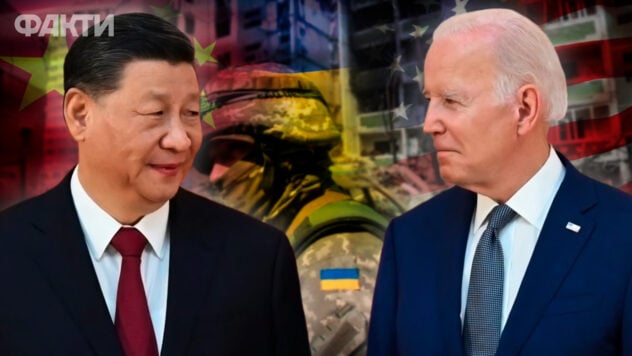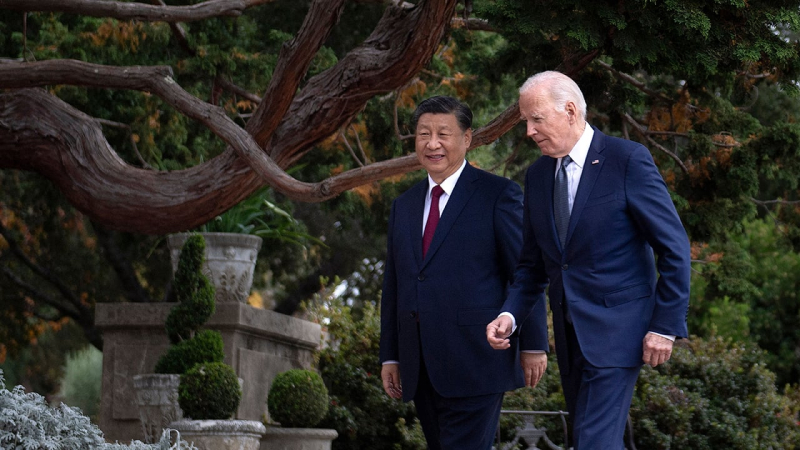
On November 15, the long-awaited meeting of the heads of the United States and China, Joe Biden and Xi Jinping, took place near San Francisco. The leaders of the two superpowers also focused on the situation in Ukraine.
The negotiations lasted about four hours.
As Biden noted in media comments, he and Xi exchanged views “on a number of regional and global issues.” We are talking, in particular, about “Russia’s refusal to stop the brutal and aggressive war against Ukraine and the conflict in Gaza.”
Currently watching
What impact this meeting can have on our state, Facts ICTV asked Igor Reiterovich , a political scientist, head of political and legal programs at the Ukrainian Center for Social Development.
China's position on the war in Ukraine
Following the negotiations, Beijing's public position on the war in Ukraine was voiced by Chinese Foreign Ministry speaker Mao Ning.
She confirmed that the leaders discussed international issues such as the “Ukrainian crisis” and the Palestinian-Israeli conflict.
According to the speaker, negotiations between Biden and Xi will not change China’s position regarding the “crisis in Ukraine.” This is exactly what official Beijing calls the aggressive war unleashed by the Russian Federation.
– China’s position on both issues (the wars in Ukraine and Israel – Ed .) is clear and consistent. We stand on the side of equality and justice and remain committed to advancing negotiations for peace and de-escalation,” Mao Ning declared.
As Igor Reiterovich explained, after the meeting between Biden and Xi , one should not expect dramatic changes in China’s rhetoric . Beijing continues to advocate “world peace” and negotiations.
Want to rest? Come to Facti.GAMES!

Photo: Getty Images
– I think that we shouldn’t expect anything publicly yet. There will be no fundamental changes at the level of public statements. Or, for example, a change in China’s position regarding the acceptance or non-acceptance of the Ukrainian peace formula,” the political scientist noted in a commentary to ICTV Facts.
Whether the negotiations between Biden and Xi were successful in the context of the Russian-Ukrainian war will be shown by other “indirect moments.” And they are the ones to watch.
The impact of the negotiations on Ukraine: two key points
According to Igor Reiterovich, we are talking about two important points:
1. Presence of the Chinese delegation at the next meetings on the Ukrainian peace formula.
2. Restriction of trade between China and the Russian Federation with dual-use goods that Russia can use for military purposes.
It is Beijing's further position on these issues that will demonstrate whether Biden was able to influence Xi and dissuade the PRC from helping Russia.
• World formula
As you know, China missed the meeting of national security advisers in Malta at the end of October, where the Ukrainian peace formula was discussed. At the same time, representatives of the PRC attended the summit in Jeddah (Saudi Arabia).
Earlier, the Chinese Foreign Ministry announced its vision of resolving the war in Ukraine. This 12-point plan did not contain a call for the Russian Federation to withdraw its troops. Instead, there was a clause about the need for “peaceful negotiations.”
The Ukrainian peace formula contains a clear requirement for the withdrawal of Russian troops from Ukraine and the cessation of hostilities. And also about the release of all captured Ukrainians and the responsibility of the Russian Federation for aggression.
• Trade between China and Russia
Igor Reiterovich noted that Chinese companies trading with the Russian Federation are private only in form, but act “in full understanding with the Chinese authorities.”
Even before the meeting between Biden and Xi, the United States drew Beijing’s attention to the problem of such trade.
“The United States sent a hint: we know that certain companies are selling dual-use goods that can be used to make weapons, and pay attention to this. If China reduces these trade deals, then Xi Jinping has heard Joe Biden. And they (the Chinese authorities – Ed .) decided for now to reduce ties with the Russian Federation in order to improve relations with the United States,” Reiterovich emphasized.
This will have a direct impact on the war in Ukraine, because the aggressor will not receive goods important for its military machine.
If no changes occur, this means that each side – the United States and China – remained on its own.
– But this is neither good nor bad for us. This is not the worst option. Because the worst option would be if they did not agree on anything at all – to resume some kind of relationship. And this would then have a blow to the Russian-Ukrainian war in the sense that China would have a completely free hand to support Russia, for example, in the military-industrial complex,” noted Igor Reiterovich.
So now we need to watch China's moves after the San Francisco talks.
Biden-Xi meeting: cautious optimism
According to Advisor to the Head of the Office of the President of Ukraine Mykhailo Podolyak, the meeting between Joe Biden and Xi Jinping causes “cautious optimism.”
“This is a big signal to the world – dialogue instead of confrontation, a new global order, rules are required, stability and predictability,” Podolyak wrote on the social network.
According to him, these negotiations indicate that “Russia has finally been excluded from the list of those who really influence global processes.” Because the aggressor relies on chaos, destruction and uses violence as a tool of foreign policy.
– And has a disgusting reputation. All this is not necessary for those who want to see horizons, the future, mutual restrictive rules,” Podolyak concluded.
Currently, the key public achievement of the negotiations between Joe Biden and Xi Jinping is the resumption of military ties.
Beijing ended these contacts in 2022 following a visit by US House Speaker Nancy Pelosi to Taiwan.

